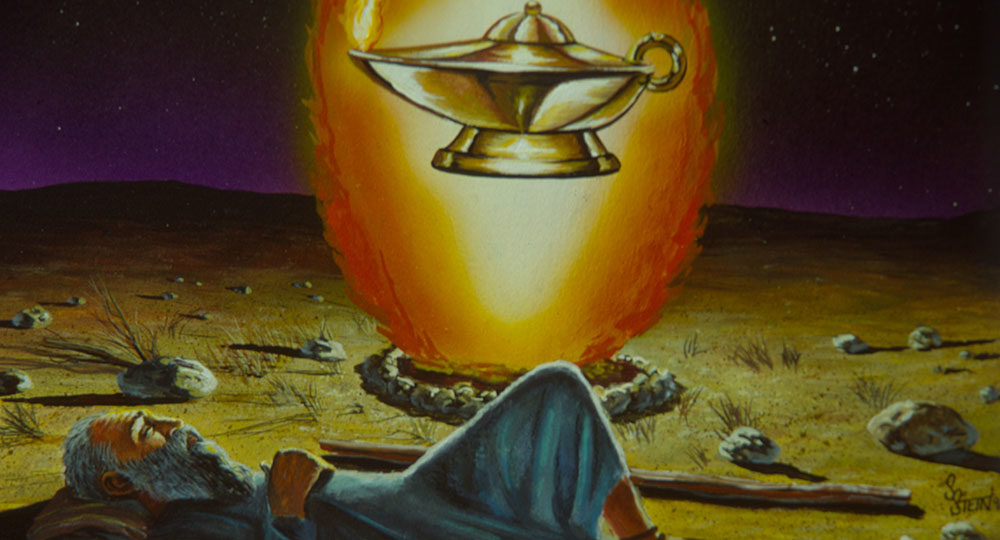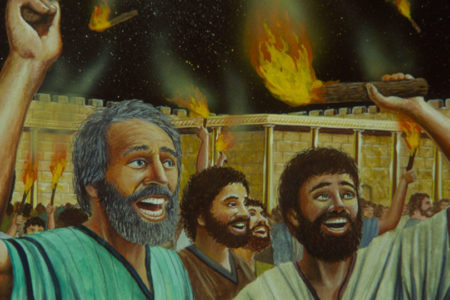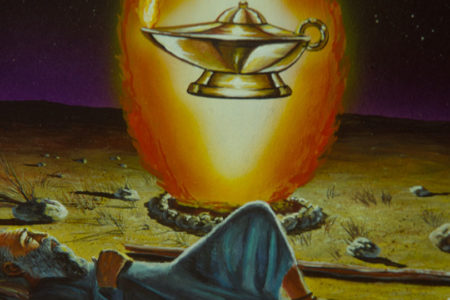Abraham: “Blessings on You, My Friend!”
Blessing—what does the word mean? We use it so freely: “Bless you, my brother,” “Bless you, my sister,” and, when someone sneezes, “God bless you!” It is not uncommon to use phrases like these with people we meet, respect, or love; and sometimes we even use such a phrase with total strangers. We may even have used the term in a derogatory way with unpleasant overtones. But what does it mean to bless someone?
Webster’s Unabridged Dictionary lists nine definitions for the word bless. Some have little or nothing to do with the passage to be examined in Genesis 12, but several could relate to that portion of Scripture.
The first meaning given by Webster is “to set apart, to consecrate for holy purposes, to make and pronounce holy.” Other possibly relevant definitions are “to make happy, to make successful, to make prosperous in temporal concerns” and “to bring much happiness to.”
The Hebrew word used for bless is Barak which means to know or bless. In Genesis 12, it is used in the sense that God blesses: “thou shalt be a blessing. And I will bless them that bless thee, and curse him that curseth thee: and in thee shall all families of the earth be blessed” (Gen. 12:2b–3). With these verses in mind, let’s explore what God meant when He spoke these very familiar words to Abraham.
ABRAHAM WAS BLESSED IN MANY WAYS
Abraham was a Successful Man
God’s blessing on Abraham was literal. He was a successful man with many material blessings. For a time he and his nephew Lot shared the same land; however, they eventually had to separate because of the abundance of God’s blessing: “And the land was not able to bear them, that they might dwell together; for their substance was great, so that they could not dwell together” (Gen. 13:6). The Lord had given Abraham so many material blessings that he and Lot had to go their separate ways so that there would be adequate grazing land for their flocks.
Throughout the Book of Genesis we observe the same fact. For example, “he had sheep, and oxen, and he-asses, and menservants, and maidservants, and she-asses, and camels” (12:16) and “Abraham was very rich in cattle, in silver, and in gold” (13:2). We also know that he had a large sum of money with which to purchase the cave of Machpelah in Hebron as a burial place for his family (23:4–20). God blessed Abraham with physical success and riches.
Abraham was a Redeemed Man
The Scriptures teach that Abraham was redeemed. Isaiah 29:22 says, “Therefore, thus saith the Lᴏʀᴅ, who redeemed Abraham … ” The Word of God is clear about how this redemption was attained: “And he believed in the Lᴏʀᴅ; and he counted it to him for righteousness” (Gen. 15:6). He was redeemed by faith rather than by any works that he had done. That has not changed up to the present day—a person is redeemed only by faith in the Lord, not by any works of righteousness. The Bible also teaches that Abraham’s redemption assured him a place in Heaven. Jesus said, “many shall come from the east and west, and shall sit down with Abraham, and Isaac, and Jacob, in the kingdom of heaven” (Mt. 8:11).
Paul reiterated the blessings of God bestowed on Abraham. “Cometh this blessedness, then, upon the circumcision only, or upon the uncircumcision also? For we say that faith was reckoned to Abraham for righteousness” (Rom. 4:9). An amazing truth is presented here. Not everyone who is of the seed of Abraham by faith is his physical descendant. Rather, those who have trusted in Christ by faith have become Abraham’s spiritual seed. We too can have the same eternal home that Abraham has, but we must obtain it the same way he did—by faith.
Abraham was Called the Friend of God
What a privilege to be called “the friend of God.” Abraham is called this twice in the Scriptures (Isa. 41:8; Jas. 2:23). The James 2 passage occurs in a portion dealing with Abraham’s faith and the righteousness imputed to him because of that faith. It was in light of his faith that Abraham was called “the friend of God.” Conversely, in the same epistle James stated that to be a friend of the world is to be an enemy of God (Jas. 4:4). Abraham must have been separated from the world to have been shown such respect in the Word of God. In like manner, we should be willing to break our friendships with the world to gain the praise of God.
Abraham was in a Covenant Relationship with God
From the time of Adam to Abraham, multitudes of people were born into the world. Sin also came in and multiplied until God had to deal with mankind by means of the flood of Noah’s day. But even after the flood, sin continued to abound to the extent that the Lord had to come down at Babel and scatter mankind through the division of their languages. The population of the world grew once again, and once again God had to step in. This time, as before, He chose one person through whom the redemptive line would come. Abraham was that man. In dealing with Abraham, the Lord gave him a covenant that depended solely upon Himself and not upon the frailties of sinful man.
It was an Unconditional Covenant
This covenant was first given to Abraham in Genesis 12:1–3, the verses we have considered in the last several articles in this series. A covenant is a promise made by two or more parties—a commitment made to one another. But the Abrahamic Covenant was unconditional; that is, it depended on only one party to the covenant, and that party was God Himself. God had done this on other occasions. He had, in a sense, covenanted with Adam that the “seed of the woman” would one day destroy Satan (Gen. 3:15). He had also made an unconditional promise to Noah that there would never be another flood to destroy the earth (Gen. 9:11), and He sealed that promise by placing a rainbow in the sky (Gen. 9:12–16). The phrase I will is either stated or implied five times in Genesis 12:1–3; therefore, the covenant does not depend upon man but upon the one who said, “I will.” The completion of this covenant rested solely upon the Lord. The promises given to Abraham are as follows:
- “I will make of thee a great nation” (v. 2).
- “I will bless thee” (v. 2).
- I will “make thy name great” (v. 2).
- “I will bless them that bless thee” (v. 3).
- I will “curse him that curseth thee” (v. 3).
A very important promise was added at the end of this passage: “in thee shall all families of the earth be blessed.” We Gentile believers have been the recipients of the blessing of God through this portion of His promise to Abraham. We receive this blessing as a result of being in Christ. This concept will be further developed from the New Testament in a future article. Suffice it to say that a portion of the Abrahamic Covenant is fulfilled every time a person trusts Christ as personal Savior.
It was a Covenant Passed on to Other Generations
Usually a covenant lasts only as long as the participants in the covenant live. Marriage is an illustration of a covenant relationship between two people that should last “till death do us part.” Then that relationship is broken. The covenant that God made with Abraham, however, was passed on to his progeny.
The Abrahamic Covenant was reiterated several times during Abraham’s lifetime. Details were added as time went on. He was promised that God would show him a land in Genesis 12, but the boundaries of that land were not given until Genesis 13:14–15 and 15:18. Not only was there to be a land, but a great seed would issue forth from this-elderly, childless man—an incredible promise that only God could keep. More details concerning this seed are given in Genesis 22:15–18.
The promises of the covenant were repeated to Isaac. In Genesis 26:3–4 God said to him, “Sojourn in this land, and I will be with thee, and will bless thee; for unto thee, and unto thy seed, I will give all these countries, and I will perform the oath which I swore unto Abraham thy father; And I will make thy seed to multiply as the stars of heaven, and will give unto thy seed all these countries; and in thy seed shall all the nations of the earth be blessed.” The Lord made it very clear to Isaac that the covenant given to his father Abraham was to be continued through him.
In the dream of the ladder reaching to Heaven, the Lord once again rehearsed the covenant, this time through Jacob: “And, behold, the Lᴏʀᴅ stood above it, and said, I am the Lᴏʀᴅ God of Abraham, thy father, and the God of Isaac: the land whereon thou liest, to thee will I give it, and to thy seed; And thy seed shall be as the dust of the earth, and thou shalt spread abroad to the west, and to the east, and to the north, and to the south: and in thee and in thy seed shall all the families of the earth be blessed” (Gen. 28:13–14).
TYPES OF COVENANTS
The Salt Covenant
There were three types of covenants in the Old Testament. The first was the salt covenant. Salt was always regarded as a necessary ingredient for food, and so it was used in sacrifices to God (Lev. 2:13). In the Middle East, when men ate together they became friends. It was part of Middle Eastern hospitality. Arabs often said, “There is salt between us” or “He has eaten of my salt,” which means to partake of another person’s hospitality. This cemented friendships. Sacrificial meals usually confirmed covenants, and salt was always present. Second Chronicles 13:5 says, “Ought ye not to know that the Lᴏʀᴅ God of Israel gave the kingdom over Israel to David forever, even to him and to his sons by a covenant of salt?” David received his kingdom forever from the Lord by means of a salt covenant.
The Shoe Covenant
Another form of covenant was the shoe covenant. In Deuteronomy 25, Moses gave the Israelites various regulatory practices. Verses 5 to 10 state that if a married man died without children, it was his brother’s duty to take his dead brother’s wife as his wife and raise up a seed through her in his dead brother’s name. If he refused, the woman was to go to the elders and tell them. Then, in a public ceremony, she was to take off his shoe and spit in his face. It was a sign of disgrace.
The Book of Ruth gives an example of the removal of the shoe, which came out of an older custom (4:5). Boaz became Ruth’s kinsman-redeemer, and to seal the covenant he took off his shoe (4:8). He then purchased Ruth to be his wife and raised up seed for her dead husband’s inheritance. It is a picture of Christ, who is our kinsman-redeemer in that He has purchased us with His blood.
The Blood Covenant
The third type of covenant was the blood covenant, one sealed with the shed blood of animals. It was the most sacred of all the covenants, and it was this type of covenant that God made with Abraham.
In Genesis 12:1–3 the plan of this covenant was laid out, as well as promises given. However, as God unfolded His plan to Abraham in greater detail in Genesis 15, He commanded the patriarch to slay several animals—a heifer, a she-goat, a ram, a turtledove, and a young pigeon (v. 9). The larger animals were divided in half, the smaller ones laid out on the rocks. Then “a deep sleep fell upon Abram,” and the Lord cut the covenant (v. 12). Instead of both of the parties to the covenant walking between the animals, the Lord alone walked between them, signifying that Abraham had no part in the making or keeping of this covenant. The Lord alone would keep it, and since it depended only on Him, it was totally unconditional. Not only did God make a covenant with Abraham that was unconditional and eternal, but it was made in the most sacred way. Abraham truly knew God’s blessing, both physically and spiritually.
We too can receive the blessings of God through the seed of Abraham: “Christ hath redeemed us from the curse of the law, being made a curse for us; for it is written, Cursed is everyone that hangeth on a tree; That the blessing of Abraham might come on the Gentiles through Jesus Christ, that we might receive the promise of the Spirit through faith” (Gal. 3:13–14). The blessing promised here is not necessarily financial or physical but spiritual—eternal life.
So, perhaps the next time you say “God bless you” or “Blessings on you, my blend,” you will consider what a real blessing is.








